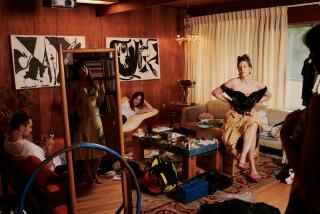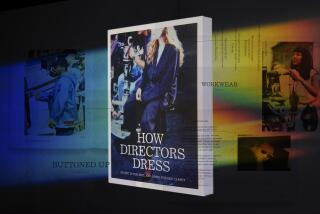A world of fantastical costumes fills Disney’s new take on ‘The Nutcracker’
Costume designer Jenny Beavan has won Oscars for dressing the English past and the apocalyptic future. Now she’s marrying the two, melding historical verisimilitude with fantasy in Disney’s “The Nutcracker and the Four Realms.”
“We set it in 1875 for the basic story,” says Beavan, of keeping the fantasy elements rooted in reality. “You’ve got to have an anchor. When you do films where they say, ‘I don’t care about the period’ and they’re all over the place, I think, even when people don’t know the period, they know it’s kind of wrong.”
Beavan took home Oscars for films about as sartorially varied as they come: the circa-1908 period piece “A Room with a View” and the circa-who’s-keeping-track-after-the-end-of-the-world “Mad Max: Fury Road.” Also a Tony nominee, Beavan has racked up eight other Oscar nominations.
FULL COVERAGE: 2018 fall movie preview »
The new “Nutcracker,” opening Nov. 2, is a live-action fairy tale, with nods to the ballet as well. In it, Young Clara (Mackenzie Foy), still mourning her late inventor-mother during the first Christmas without her, comes to a party at her godfather, Drosselmeyer’s (Morgan Freeman). She discovers the magical wonderlands her mother created and learns they’re in danger. Victorian England provides the grounding from which the magical worlds sprout.
“We decided to think about what the mother had in her closet or her cupboards,” says Beavan. “When I have nightmares or dreams, they’re often anchored in something I’ve seen that day or something I have around. So we went to the sort of Staffordshire [porcelain] figures people would have; they’re 18th century, and they were perfect for the Realm of Flowers. It translated brilliantly for all the realms. We covered them with ice and snow and icicles and frost and glitter, covered them in candy and sugar and sweet motifs. So they’re based on memory.”
“Nutcracker” was a titanic undertaking, she says, estimating that after a 12-week prep period, she had more than 100 people working, cutting and embellishing, fitting and dressing. Beavan estimates that the movie’s principals required 150 costumes (counting “repeats” — copies for stunts and such), plus hundreds more for the magical realms and about 700 rented costumes for big crowd scenes.
“It was massive,” she says of the approximately 1,500 total outfits. “Massive fun as well, don’t get me wrong.”
Some designs let her whimsy fly, such as the getup actor Eugenio Derbez dons that gives new meaning to the words “floral pattern” and the gorgeous embroidery on Freeman’s gown (“He was just so easy,” Beavan says of the veteran actor. “He loved the shoes. He has very wide feet.”).
But some of the less fantastical creations are among her favorites, such as Clara’s “mauve organza dress” as she emerges, vulnerable, from a tree into a frozen world, and her “Little Soldier” costume, based on what women of the period wore when serving in the military.
“They were out with the troops in various parts of the world, normally not actually fighting, but being backup services, nursing, what have you,” Beavan said.
RELATED: Virtually every film coming out this fall »
The costuming team’s work is remarkably intricate: the detail, the fineness of the fabrics’ textures, the use of color. Then, for the film’s lone ballet sequence, prima ballerina Misty Copeland’s garb is anything but complex.
Beavan says, “With ballet, what you’re trying to do is show the body and the line. She’s a dancer like you get in a music box, the ballerina going around. To me it was the simpler, the better. We’re so elaborate everywhere [else]. What we wanted to see from Misty and Sergei Polunin, you just want to see good ballet. And she’s the most amazing dancer.”
More to Read
Only good movies
Get the Indie Focus newsletter, Mark Olsen's weekly guide to the world of cinema.
You may occasionally receive promotional content from the Los Angeles Times.











